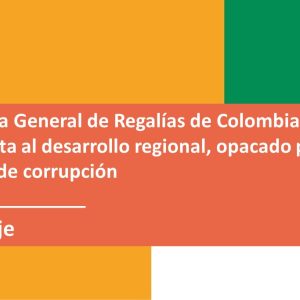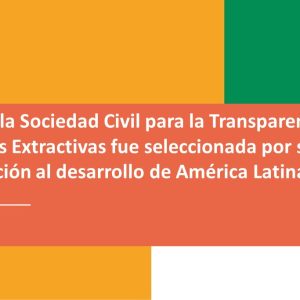– The Natural Resource Governance Institute (NRGI) and Corporación Cívica de Caldas began their participation in the Roundtable, and the Comité de Seguimiento a la Inversión de las Regalías de Córdoba reactivated its participation.
– The NRGI shared its “Diagnostic Guide to Corruption in the Extractive Sector”, a tool for diagnosing corruption.
– The Board took stock of its subcommittees and planned initiatives for the next quarter.
Bogotá, February 26, 2022
On February 25, the XXV Meeting of the Civil Society Roundtable for Transparency in the Extractive Industries was held to discuss key issues for the promotion of transparency and access to information in the extractive sector and citizen participation in the implementation of the Extractive Industries Transparency Initiative (EITI) in Colombia.
The Civil Society Roundtable for Transparency in the Extractive Industries is an instance that emerged in November 2013 and today brings together more than twenty social organizations and academic institutions, located in different parts of the country.
New members
At its XXV meeting, held virtually, the new organizations joining the Roundtable were formally presented: NRGI and the Corporación Cívica de Caldas, as well as the reactivation of the Comité de Seguimiento a la Inversión de las Regalías de Córdoba (CISR).
The Natural Resource Governance Institute (NRGI) is an independent international non-profit organization. NRGI helps people reap the benefits of their countries’ natural resource wealth, oil, gas and minerals through applied research and capacity building approaches and technical advice.
The Corporación Cívica de Caldas is a civil society organization with 40 years of experience, whose mission is to defend the collective interest in the department of Caldas. Its work includes social control through citizen oversight, monitoring of extractive projects and community accompaniment.
Diagnostic guide to corruption in the extractive sector
During the Meeting, NRGI presented to the Bureau the “Diagnostic Guide to Corruption in the Extractive Sector, a tool for research and action”. This is a participatory methodology that seeks to diagnose corruption in the extractive industries to support evidence-based actions to address this issue.
In addition, the organization Crudo Transparente presented its progress in the implementation of the guide, focused on building participatory strategies to reduce corruption risks in the Colombian oil sector.
Balance
During the Meeting, there was also a reflection on the challenges and progress of the action plans of the Subcommittees of the Roundtable, namely: General Royalties System, EITI and Environmental Affairs, as well as the Communications Committee.
Finally, the representatives to the National Tripartite Committee presented the current status of the EITI validation process in Colombia, which is scheduled to take place over the next few months.
“The La Mesa session ended with very good results. We have an action plan to promote the participation of civil society in the validation of the EITI in the country,” explained Pilar Acosta, project coordinator of Transparency for Colombia and member of the Technical Secretariat of the Roundtable. “That is why this year we plan to meet in priority territories, such as Casanare and Cesar,” he added.


